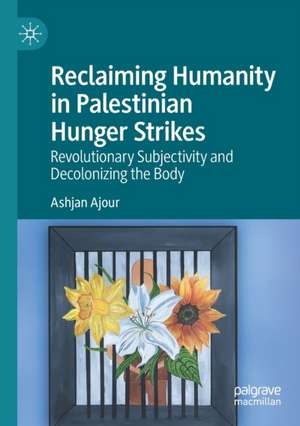Reclaiming Humanity in Palestinian Hunger Strikes: Revolutionary Subjectivity and Decolonizing the Body
Autor Ashjan Ajouren Limba Engleză Paperback – 16 dec 2022
Rooted in feminist ethnography and decolonial feminist theory, this book explores the subjectivity of Palestinian hunger strikers in Israeli prisons, as shaped by resistance. Ashjan Ajour examines how these prisoners use their bodies in anti-colonial resistance; what determines this mode of radical struggle; the meanings they ascribe to their actions; and how they constitute their subjectivity while undergoing extreme bodily pain and starvation. These hunger strikes, which embody decolonisation and liberation politics, frame the post-Oslo period in the wake of the decline of the national struggle against settler-colonialism and the fragmentation of the Palestinian movement. Providing narrative and analytical insights into embodied resistance and tracing the formation of revolutionary subjectivity, the book sheds light on the participants’ views of the hunger strike, as they move beyond customary understandings of the political into the realm of the ‘spiritualisation’ of struggle. Drawing on Foucault’s conception of the technologies of the self, Fanon’s writings on anti-colonial violence, and Badiou’s militant philosophy, Ajour problematises these concepts from the vantage point of the Palestinian hunger strike.
| Toate formatele și edițiile | Preț | Express |
|---|---|---|
| Paperback (1) | 714.92 lei 6-8 săpt. | |
| Springer International Publishing – 16 dec 2022 | 714.92 lei 6-8 săpt. | |
| Hardback (1) | 720.06 lei 6-8 săpt. | |
| Springer International Publishing – 15 dec 2021 | 720.06 lei 6-8 săpt. |
Preț: 714.92 lei
Preț vechi: 871.86 lei
-18% Nou
Puncte Express: 1072
Preț estimativ în valută:
136.86€ • 140.76$ • 113.54£
136.86€ • 140.76$ • 113.54£
Carte tipărită la comandă
Livrare economică 20 februarie-06 martie
Preluare comenzi: 021 569.72.76
Specificații
ISBN-13: 9783030882013
ISBN-10: 3030882012
Pagini: 342
Ilustrații: XVII, 342 p. 6 illus. in color.
Dimensiuni: 148 x 210 mm
Greutate: 0.43 kg
Ediția:1st ed. 2021
Editura: Springer International Publishing
Colecția Palgrave Macmillan
Locul publicării:Cham, Switzerland
ISBN-10: 3030882012
Pagini: 342
Ilustrații: XVII, 342 p. 6 illus. in color.
Dimensiuni: 148 x 210 mm
Greutate: 0.43 kg
Ediția:1st ed. 2021
Editura: Springer International Publishing
Colecția Palgrave Macmillan
Locul publicării:Cham, Switzerland
Cuprins
1: Introduction.- 2: Hunger Strike Resistance: A Brief History.- 3: Field Work and Reflection on Challenges: Feminist and Decolonial Approaches.- 4: Producing Knowledge and Understanding Subjectivity through Lived Experience.- 5: Theoretical Framework: Theories of Subjectivity and Subjectivation.- 6: Dispossession of Humanity: The Pre-hunger Strike Stage.- 7: Reclaiming Dispossessed Humanity: The Decision to Hunger Strike.- 8: The Embodiment of Humanity: Technologies of the Self and Resistance in the Hunger Strike.- 9: ‘Strength’, Conflict, and the Body in Pain.- 10: Self-Determination and the Struggle with Death.- 11: Strength, Continuity and Steadfastness (Sumud).- 12: The Meaning of Victory: Sovereignty Over the Body in the Hunger Strikers’ Philosophy of Freedom.- 13: Conceptualising a Limit-Experience: The Hunger Strike as a Near-Death.- 14: Conclusion.
Notă biografică
Ashjan Ajour is an Academic Researcher in Sociology at the University of Leicester, UK and the incoming Postdoctoral Research Associate in the Centre for Middle East at Brown University, USA. Her research focuses on gender, feminist theories and movements, decolonization, political subjectivity, and incarceration.
Textul de pe ultima copertă
Rooted in feminist ethnography and decolonial feminist theory, this book explores the subjectivity of Palestinian hunger strikers in Israeli prisons, as shaped by resistance. Ashjan Ajour examines how these prisoners use their bodies in anti-colonial resistance; what determines this mode of radical struggle; the meanings they ascribe to their actions; and how they constitute their subjectivity while undergoing extreme bodily pain and starvation. These hunger strikes, which embody decolonisation and liberation politics, frame the post-Oslo period in the wake of the decline of the national struggle against settler-colonialism and the fragmentation of the Palestinian movement. Providing narrative and analytical insights into embodied resistance and tracing the formation of revolutionary subjectivity, the book sheds light on the participants’ views of the hunger strike, as they move beyond customary understandings of the political into the realm of the ‘spiritualisation’ of struggle. Drawing on Foucault’s conception of the technologies of the self, Fanon’s writings on anti-colonial violence, and Badiou’s militant philosophy, Ajour problematises these concepts from the vantage point of the Palestinian hunger strike.
Caracteristici
Incorporates testimonials from ex-political prisoners Uses a feminist lens in its sociological and anthropological examination of hunger strikes Dismantles the false binary of non-violent vs. violent resistance
